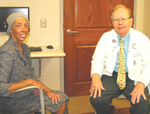Swimmer rebounds from ovarian cancer
by Maggie DieboltPublic Relations
In a matter of months, Jane Bradley went from swimming six miles a day to needing help out of the water after just a few laps.
Bradley, a 57-year-old former Olympic swimmer, and healthy her whole life, was diagnosed with Stage III ovarian cancer in October 2006. The cancer was discovered during an unrelated operation.
 Former Olympic
swimmer and cancer survior Jane Bradley has a follow-up appointment
with OB/GYN's Dr. William Creasman.
Former Olympic
swimmer and cancer survior Jane Bradley has a follow-up appointment
with OB/GYN's Dr. William Creasman.“I’ve been monstrously healthy all my life. I’ve been physically fit, slender, and primarily a vegetarian,” Bradley said. “The pain felt bad, but I never guessed I was sick.”
A competitor in the 1964 Tokyo and 1968 Mexico City Olympic games, Bradley’s battle with “the silent killer” began when she underwent cancer removal surgery in December 2006, and started chemotherapy in January.
In what could be attested to her healthy lifestyle, Bradley has responded very well to both the surgery and chemotherapy. As of now, she has no trace of cancer in her body and has even started swimming again.
Symptoms of ovarian cancer mimic those of other common conditions, like digestive and bladder disorders. Such difficulty in detection is a reason that two-thirds of ovarian cancers are in their advanced stage when finally diagnosed. Bradley experienced some of the common symptoms, which include abdominal pressure, fullness, swelling or bloating; urinary urgency and pelvic discomfort or pain. However, her primary care physician told her that her symptoms simply amounted to consequences of having had children earlier in her life.
Women experiencing any of these symptoms for an extended period of time should immediately see a doctor, said William Creasman, M.D., Obstetrics and Gynecology. Creasman also advises women to get a pelvic exam along with their annual pap smear, as symptom recognition and regular pelvic exams are often the best ways to detect the cancer early.
“The symptoms of ovarian cancer are subtle,” Creasman said. “They affect 50- to 60-year-olds more frequently. People often attribute symptoms of ovarian cancer to natural signs that they are getting older, putting on weight or suffering from incontinence. If you have symptoms and they persist, you need a physical exam. Pelvic exams are critical in women with these types of symptoms.”
September is Ovarian Cancer Awareness Month and Gynecologic Cancer Awareness Month. Ovarian cancer ranks fifth in cancer deaths among women, and it is estimated that more than 22,000 women will be told they have ovarian cancer this year. Of those women, more than 15,000 will die from this deadly form of cancer.
For information on ovarian cancer, visit http://ovariancancerawareness.org/.
Friday, Sept. 21, 2007
Catalyst Online is published weekly,
updated
as needed and improved from time to time by the MUSC Office of Public
Relations
for the faculty, employees and students of the Medical University of
South
Carolina. Catalyst Online editor, Kim Draughn, can be reached at
792-4107
or by email, catalyst@musc.edu. Editorial copy can be submitted to
Catalyst
Online and to The Catalyst in print by fax, 792-6723, or by email to
catalyst@musc.edu. To place an ad in The Catalyst hardcopy, call Island
Publications at 849-1778, ext. 201.